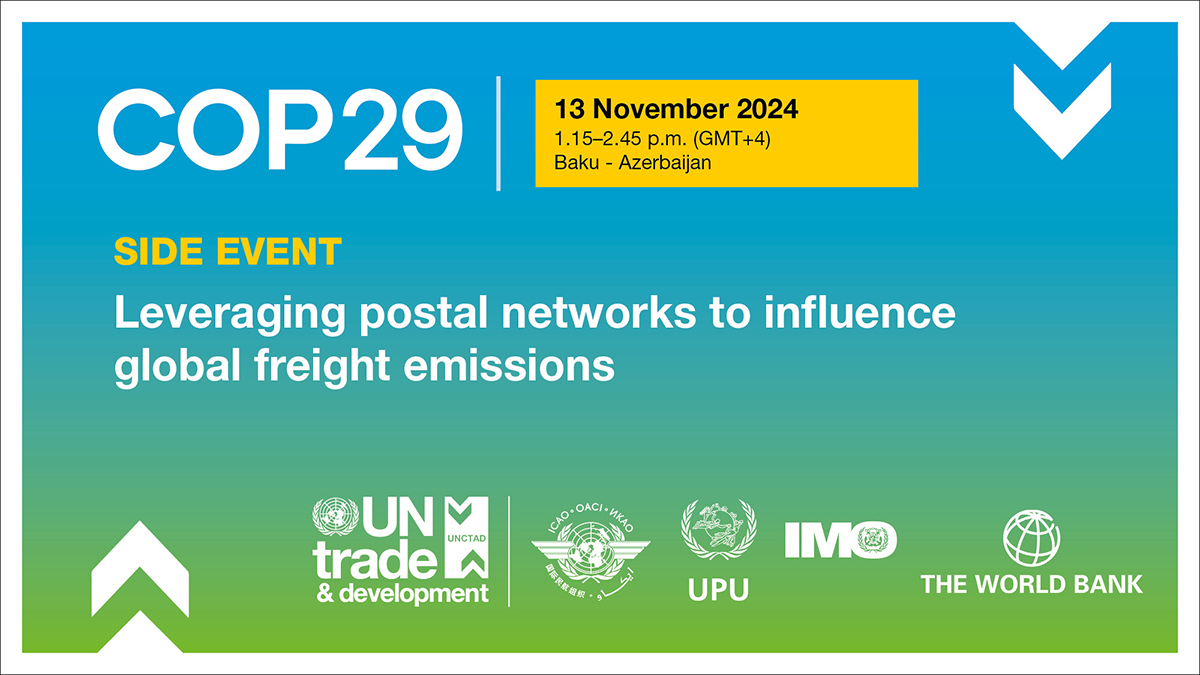
End-to-end delivery of international parcels and letters requires close cooperation by multiple actors, and has historically focused on optimizing payment, speed, efficiency and security. Stakeholders urgently need to expand this cooperation to optimize the global postal network to minimize its climate impact. This event focuses on the opportunities to reduce freight emissions that are spread across the postal value chain.
Freight transportation is a significant contributor to global greenhouse gas (GHG) emissions, accounting for approximately 10% of the world's emissions. As the demand for freight services continues to rise, it is imperative to address the environmental impact of this sector. However, current national efforts, including the NDC policies, are often narrowly defined around passenger transport. Given the pivotal role of postal networks in global freight movement, these networks present a unique opportunity to address related policy discussions and to influence and reduce emissions associated with freight movement. This is especially true in the context of growing global e-commerce, where the global postal network handles two-thirds of small consignments in the cross-border market.
Featured with a panel presentation and roundtable discussion, the primary objective of this side event is to explore and discuss strategies to leverage the global postal networks to significantly reduce GHG emissions from freight movement. Emissions from different modes of transportation—aviation, maritime, road, and rail—as well as from warehouse, port management and delivery, are addressed respectively in various global and national frameworks.
This side event aims to enhance understanding and awareness among COP participants of recent developments and progress in this context. By prioritizing technology innovation, optimized transport modes, supportive policy frameworks, and strategic investment, this event aims to catalyze impactful and coordinated efforts, fostering lasting partnerships and forward-looking actions across the postal climate value chain.
Agenda
| 13:15-13:50 | Opening remarks |
| Following the introduction by UPU and opening remarks of Mr. Isi Mustafayev, a 20-minute presentation by the five organizing agencies—ICAO, IMO, UNCTAD, UPU, and the World Bank—will cover key topics such as freight movement and the postal value chain, its associated climate impact, evolving sustainability practices, and governance efforts. Each agency representative will also discuss their respective agency's focus on postal freight movement, relevant global policy progress, and potential for collaboration across postal climate value chain in order to insert demand-side intervention aimed at reducing freight emissions. | |
List of Speakers
| |
| 13:50-14:35 | Roundtable discussion: demand-side intervention, challenges and solutions |
The roundtable will begin with the first group of participants sharing country examples and market practices, highlighting practical challenges, and then exchanging ideas on solutions. They are invited to address specific climate transformation issues faced by postal and logistics players, along with efforts to leverage the network to drive upstream and downstream sustainability practices. Topics could include access to clean technologies, infrastructure financing, modal optimization, cross-sectoral policy support, and data collaboration across the value chain, with participants offering both insights and proposed solutions. Delegates of Supporting Agencies will then be invited to consider how they can support cross-sector collaboration to address freight emissions and opportunities for collective efforts to establish the necessary enabling conditions.
List of Participants
Country experience and market practices
Delegates of Supporting Agencies
| |
| 14:35-14:45 | Concluding remarks |


